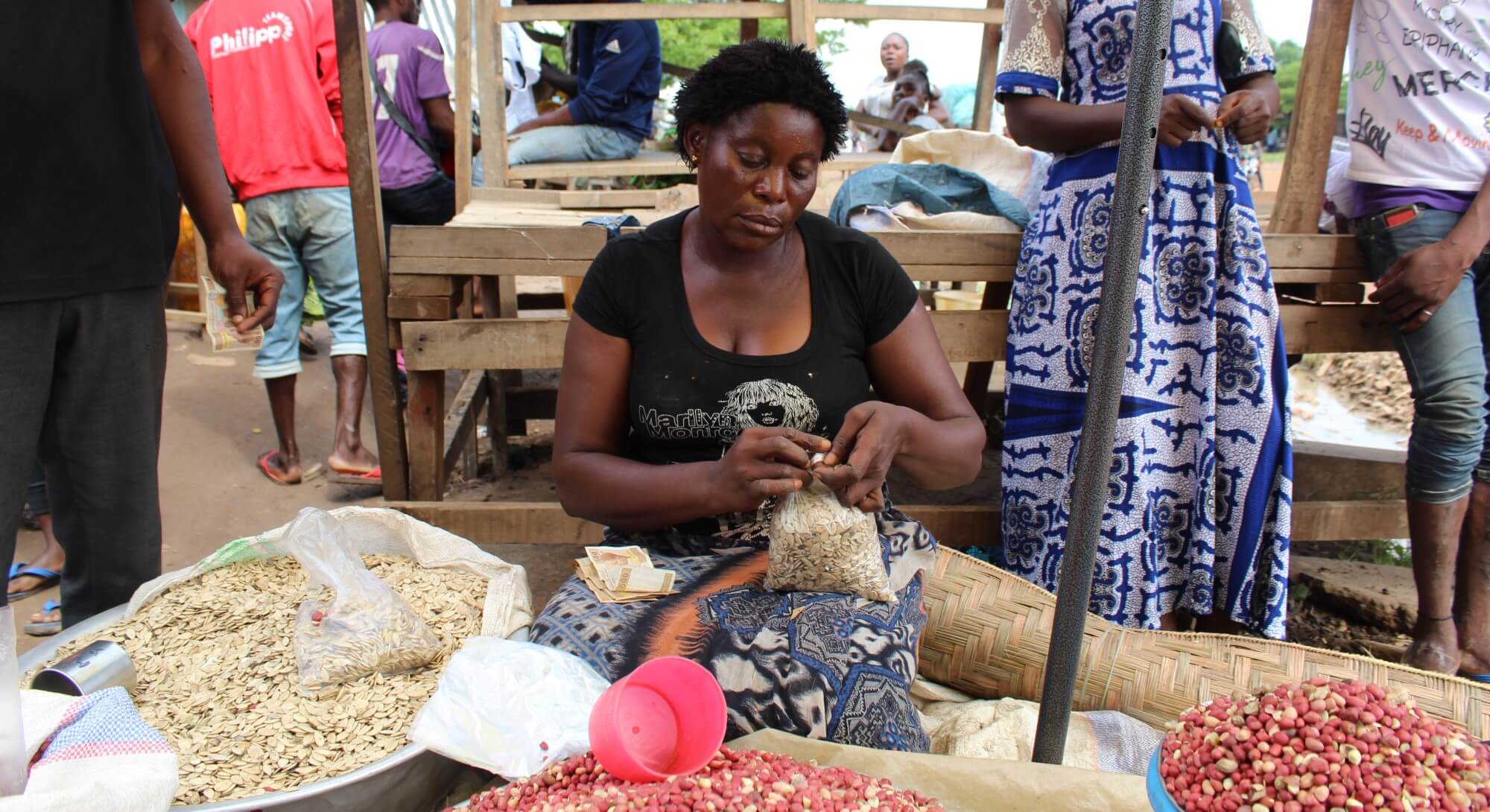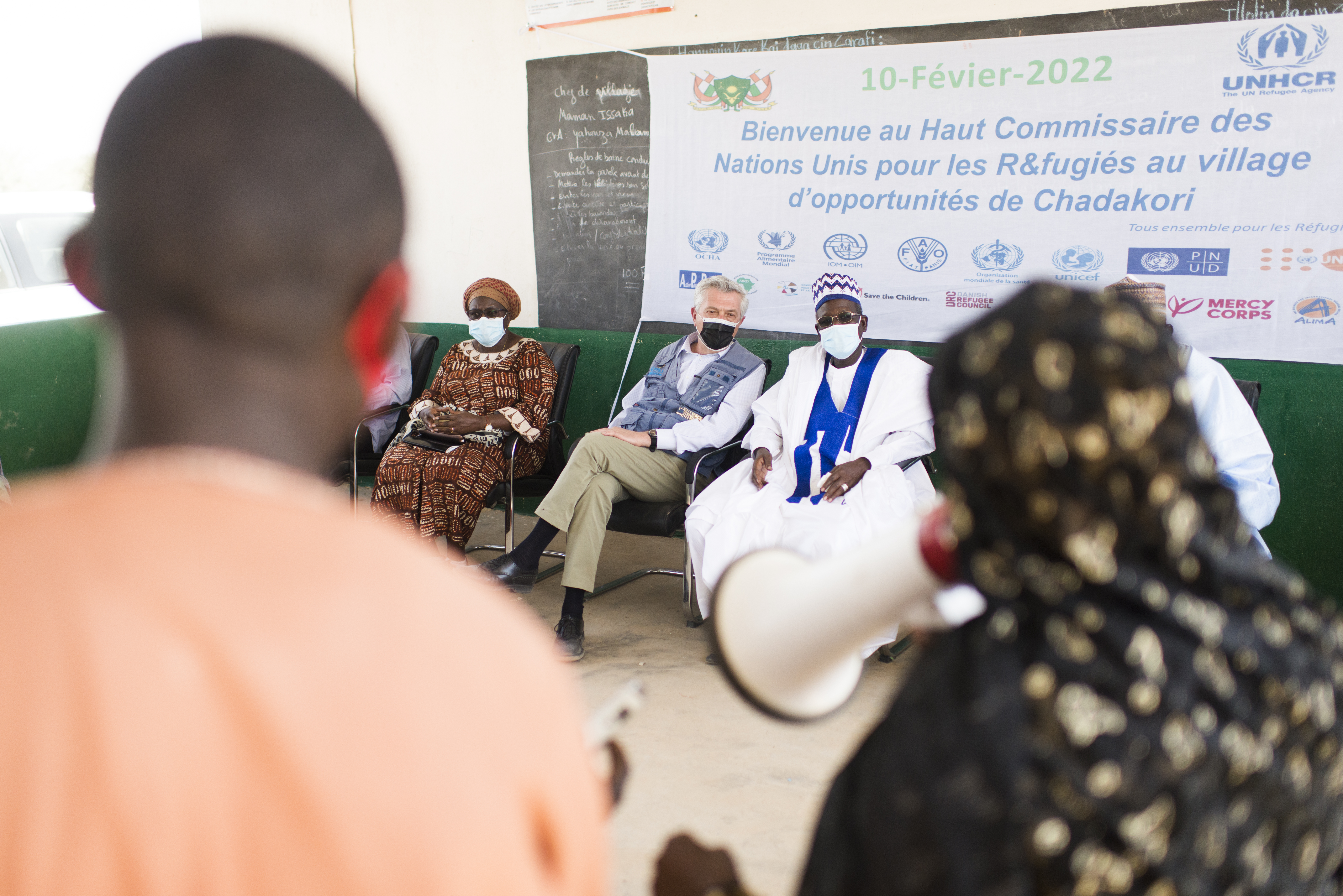The Lisungi Experience
The Lisungi Experience

Ortense, a refugee from DRC, and a beneficiary of Lisungi grants, at her market stall in Betou
The Republic of Congo (RoC) hosts more than 60,000 refugees and asylum seekers, predominantly from the Central African Republic (CAR), the Democratic Republic of the Congo (DRC), and Rwanda. At the beginning of 2021 alone, more than 8,000 refugees arrived from CAR, fleeing post-electoral violence. Nearly three quarters of refugees and asylum seekers in the country live in rural areas, with more than half living in the Likouala department in the North.
Refugees in RoC enjoy a largely positive protection environment, with no limit on freedom of movement, access to social services (including health and education) and the justice system, as well as relatively unrestricted employment rights. Yet, like members of their host communities, refugees face challenges in terms of overstretched services and few economic opportunities, further exacerbated by the COVID-19 pandemic and a long-lasting economic crisis. In the Likouala department, the situation is aggravated by the remoteness of the areas in which many people live, hampering economic activity.
In 2014, the Government launched the Lisungi Social Safety Nets Project – with US $17 million co-financed by the International Development Association (IDA) – aiming to “establish the key elements of a national social safety net program and to pilot a social transfer program”. The programme targets the country’s most vulnerable households and provides conditional cash transfers, as well as cash for income-generating activities. The cash transfers are conditional on school attendance for children and regular health check-ups, aiming to enhance investment in people's futures.
Partnering for inclusion
In January 2019, the Project received USD 22 million in additional financing from the refugee sub-window of the World Bank’s IDA 18. This enabled the expansion of the Project to include refugees and their host communities, in line with the Government’s strong engagement taken towards the inclusion of refugees and support to host community in its 2017 Development Policy Letter. With recipients split evenly between refugees and members of the host communities, the extension enabled the Lisungi Project to be deployed in the Likouala department for the first time, and to expand in Brazzaville and Pointe Noire. In total, an additional 4,000 households will receive conditional cash transfers and 8,000 will be granted support for income-generating activities. Support to the health and education sectors was also included to enhance the quality-of-service delivery there.
At the end of 2020, a data-sharing agreement was signed between UNHCR and the Lisungi Project to facilitate the identification of refugees for inclusion in the Project. In April 2021, the two parties signed a one-of-its-kind technical assistance agreement, for UNHCR to support in the implementation of the project, including capacity building for stakeholders on refugee rights, further sensitization of beneficiaries, monitoring and evaluation, and logistics – particularly in the Likouala department, where UNHCR has a long-standing presence.
The first round of conditional cash transfers started in September 2021. Currently, almost 1,850 refugee households and more than 3,300 Congolese households are receiving quarterly conditional cash transfers, while around 700 and 2,700 respectively have so far received assistance for income-generating activities.
UNHCR is supporting the Project through monitoring and evaluation, including administering household surveys, in order to quantitatively monitor implementation and identify any potential adjustments that might be required. The first survey conducted found that conditional cash transfers seem to remove certain barriers to accessing education and to children and women receiving healthcare, while enabling increased food consumption and the potential for money to be saved. It resulted in a third of households investing their allowances in income-generating activities, a trend confirmed by the results of the second survey, which also highlighted more long-term investments on housing and livelihoods.
Creating opportunities, driving equality
Louis Molongo, 46, is a widowed mother of three children who could not attend university because of a lack of opportunity. Having received an income generating activity grant from the Lisungi Project, she proudly said that she is now her “own boss”, buying and selling food items such as peanuts, beans, pumpkin seeds and palm oil. She has her own stall in the main market of Bétou, in the North of Congo. “When business is good, I can save 25 000 XAF ($50)”, she said, adding that this is after meeting her family's basic needs. Now, Louise hopes to be able to save enough get her own plot and build a house for herself and her children and stop paying rent.
Jean-Pierre Kabo, a 28-year-old refugee from the Central African Republic, is known as "Ciseaux d'Or" (Golden Scissors) by his neighbours and customers in Bétou. A beneficiary of the Lisungi Project's conditional cash transfers, this father of two, who arrived in Congo with his parents in 2002, is now happy to use his own sewing machine and to work for himself. With the next Lisungi grants, he plans to consolidate his business with a sewing workshop and organize a fashion show.
Antoinette, a refugee from the Central African Republic, has looked after six grandchildren since her daughter died. She uses the Lisungi cash transfer to meet their food, health, clothing, and education needs, complementing humanitarian aid she receives. She also used part of the money to replace the roof of the house she and her grandchildren live in, thanks to a host family’s hospitality and generosity. Antoinette's eldest granddaughter, Louise, took the baccalaureate exams this year and hopes to go to university.
A bridge between development and humanitarian work
The Lisungi Project has also been a successful example of the role of development work in emergency contexts, enabling a bridge between humanitarian assistance and development aid. When the violence broke out in the Central African Republic, the village of Moungoungi in the Likouala department welcomed over 1,600 refugees, tripling its original population of 830. The village had not previously hosted refugees and was therefore not covered by the Lisungi Project. However, the Project was able to be flexible and asked UNHCR to carry out the required eligibility survey in January 2022, enabling an extra 551 households to receive transfers, including a significant proportion of highly vulnerable indigenous people.
The close collaboration between the Government, the World Bank, and UNHCR, and flexibility to respond to changing needs, have been key factors to ensure the successful roll-out of the Project. The Government has already committed to continue supporting refugees and their host in the Likouala department and will expand into the Plateaux department – which hosts 15,000 refugees – through new additional financing (to the Lisungi Emergency COVID Response project), approved by the World Bank Board of Directors in May 2022, to be launched in the second half of 2022.
Evidence is already pointing towards positive changes in people’s life as a result of the project. A state-of-the-art impact evaluation, financed by the World Bank-UNHCR Joint Data Centre, and led by UNHCR Republic of Congo in partnership with academics and the World Bank, will enable to scientifically assess the impacts of the Project and will greatly contribute to the literature on social protection in forced displacement contexts.
The Lisungi experience is one of inclusion, promoting the needs of children and the most vulnerable, regardless of where they are from.
Read the full report of the first M&E survey (in French).
If you have any questions about the Lisungi Project, please email Marguerite Duponchel, Senior Development Officer, UNHCR Republic of Congo.







